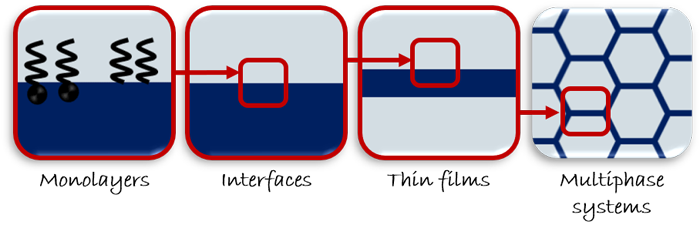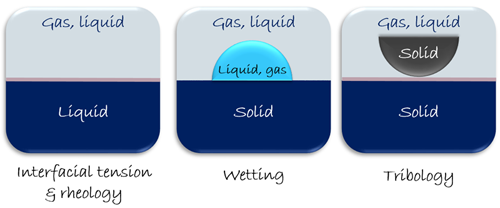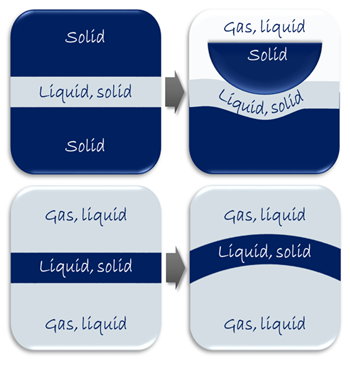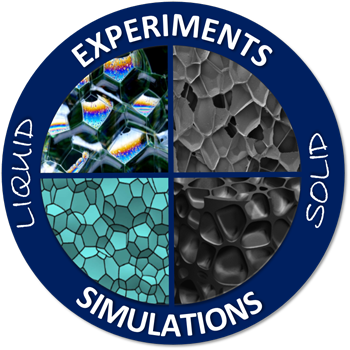Institut Charles Sadron MIM
Research
Composed of 13 permanent and ca. 15 non-permanent staff, our expertise covers the mechanics of polymer-based interfaces, thin films and of macro-cellular multi-phase systems. The different phases can be gaseous, liquid or solid; and the interfaces may be covered by (mono)layers of interfacially active agents or lubricants.
Our goal is to understand the static and dynamic response of these systems to different types of mechanical solicitations and to link investigations at different length and time scales to a global understanding of liquid and solid multi-phase systems. For this purpose, we rely on a very broad equipment park, uniting more than 30 commercial and home-built devices, some being internationally unique. Some of these devices are accessible through the plateforme MINAMEC. We routinely combine experimental investigations with advanced computational analysis and simulation.
We regularly have opportunities for internships, PhDs or postdocs. If you are interested in working with us, do not hesitate to contact us at: mim@ics-cnrs.unistra.ff

Interfaces
Our research on polymeric interfaces is dedicated to understanding the static and dynamic properties of liquid and solid interfaces in contact with a gas or a liquid. Our investigations range from tensiometry and rheology of liquid interfaces, to wetting and tribology of solid interfaces. In many cases, the interfaces are covered by a (mono)layer of interfacially active agents or lubrication agents, in order to understand their influence on the overall response of the system.
Examples of research projects in progress:
- Creation and mechanical characterisation of polymeric membranes at liquid interfaces
- Adsorption and interfacial rheology of polymers at interfaces
- Influence of macromolecular orientation and environmental conditions on contact creep and scratch response of semi-crystalline polymers surface

Thin films
We rely on a unique set of techniques (Surface Force Apparatus, Thin Film Pressure Balance, Micro-bubble technique, Indentation devices, Tribology devices, etc.) to characterise the static and dynamic properties of liquid and solid thin films (1 – 1000 nm) confined between gaseous, liquid or solid phases.
Of interest to us is to
- understand the long and short-range interactions in liquid films,
- characterise the evolution of the thin film properties during solidification,
- understand the response of thin polymeric films to deformation,
- understand the influence of thin polymer coatings and lubrication films on the tribology of solid surfaces.
Examples of research projects in progress:
- Interactions in films of ionic-liquids
- Short-range interactions in non-aqueous liquid films
- Drainage and rupture of solidifying polymer films
- Non-linear response of thin polymeric films to large deformations
- Rheology of model lipid layer to understand biolubrication
- Role of lamination in tribology

Macro-cellular multi-phase systems
Our research is dedicated to understanding the properties of macro-cellular multi-phase systems such as foams (liquid foams, polymer foams, polymer-metal hybrid foams, etc.) or emulsions (liquid, solid, etc.). Combining experiments and simulations, we elaborate methods to (1) generate such systems in a controlled manner, (2) understand their stability and (3) establish structure/property relations with emphasis on mechanical properties. The latter investigations profit from high-resolution, in-situ X-ray tomography in our team or at the synchroton SOLEIL via the MICASOL platform. Whenever possible, we combine investigations at different length scales (interfaces, thin films, etc.) to obtain a multi-scale understanding of the properties of these complex systems.
Examples of research projects in progress:
- Packing process of frictional/adhesive bubbles/drops in a liquid matrix
- In-situ characterisation of polymer-foam formation through gas release
- Generation of foams with metamaterial properties (mechanics, acoustics) thanks to new structuration phenomena
- Non-linear mechanics of polymer foams undergoing large deformations
- Gas-diffusion in closed-cell foams at large deformations
- Impact optimisation in polymer-metal hybrid foam
